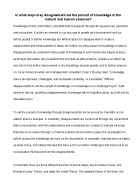While I do believe that in some cases differences of opinion in the human and natural sciences can lead to further disagreements leading to fewer findings, the majority of the time this is not the case. The basis of disagreements tends can often be traced back to both perception and reason; when people's perception or reason do not match, this often leads to disagreements in everyday life as well as in the sciences. Ideally, reason is used to back one’s theories, while perception is used to create the theory in the first place.
Disagreement is an essential component of any science – natural or human. In a perfect world, scientific ideas compete not based on catchy ads or slogans, but rather based on evidence, and even discredited ideas can be resuscitated with increased efforts to provide an accurate theory at a later time. Many ideas can be improved by criticism and disagreements among peers. Rather than smother the idea, these disagreements spark further incentive to find more evidence of accuracy. Challenged ideas lead to new studies which in turn lead to new developments. No idea in science is ever absolute since everything has the potential to be challenged. Hypotheses turn into theories, which in turn become laws, and even laws can be challenged.
Scientists use reason to search for the true answer of any given question. Just as there are different types of disagreements, the value of controversy in advancing knowledge may differ in the natural as opposed to the human sciences. Natural science is the study of natural phenomena of the universe that we live in. This field includes chemistry, biology, physics, among other disciplines. Human science can be defined as the study of people themselves and their behaviors, including matter in subjects including history, anthropology, economics, etc. Because human sciences usually uncover trends rather than absolute facts, much is open for dispute. Human sciences thus provide a fertile breeding ground for disagreements since generally studies take the form of questionnaires and observation rather than incontrovertible numbers or equations which form the basis of natural science.
A clear example of how disagreement can advance knowledge in the natural sciences can be found in Einstein's Theory of General Relativity, which is a continuation of Newton's Law of Gravity. Because Einstein questioned Newton's law – i.e., disagreed with certain aspects of it - he conducted further research and produced a theory that today gives us a better understanding of the universe and interactions of objects even in strong gravitational fields. Einstein's theory starts with Newton's law and makes it applicable in a more sophisticated and complex realm of gravitational fields.
Another, less direct, example of how disagreement can lead to advances in science is technology developed for war purposes. War is disagreement on an international scale, but often technological advances made in an effort to win the conflict have peaceful applications after the war has ended. Without the war (the conflict or disagreement), mankind would be less technologically advanced.
On the other hand, there are plenty of examples of instances when disagreements do not aid in the pursuit of knowledge. As discussed above, disagreements about facts and interpretations can help to move things along, so long as the people disagreeing are working from the same scientific base towards a common goal albeit using conflicting evidence. In other instances, however, the fundamental principles underlying the disagreement may be so different that the disagreement essentially can be described as two ships passing in the night – no common ground, not even the same basis of argument. In these cases, disagreement does not advance knowledge and indeed, it might restrict its advancement.
One example of unproductive disagreement is the persistently popular theory of “creationism” versus the theory of evolution. People who advance the theory of creationism are not arguing from scientific fact, but rather from religious belief based on stories in the Bible. There is no amount of scientific evidence that will change their opinion. Similarly, those who accept the theory of evolution are not persuaded by religious doctrine. About the only thing the two sides agree upon is that there must be some theory for how humans came to be on Earth – beyond that, there is little room for productive disagreement. Indeed, there are two very different kinds of knowledge that are at stake – one is scientific and one is religious. Disagreements within the two camps might advance knowledge in each, but disagreements between the two aren’t likely to persuade anyone to switch sides.
Climate change is an area in between where is there is not only disagreement based on rational science but also disagreement based on other, less quantifiable and provable areas as well. Disagreements as to the cause or extent of human actions in causing climate change may well serve to advance knowledge, but those who flatly deny that climate change is happening at all base their position on emotion rather than reason. As in the case of creationism vs. evolution, disagreement between those two camps is unlikely to advance knowledge overall. When the basis of argument is so fundamentally different – i.e., emotion rather than reason and evidence – the prospect of productive disagreement diminishes sharply.







